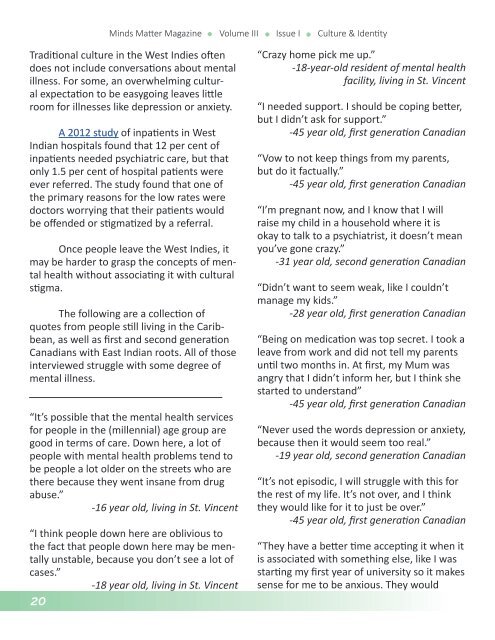Culture & Identity
You also want an ePaper? Increase the reach of your titles
YUMPU automatically turns print PDFs into web optimized ePapers that Google loves.
Minds Matter Magazine Volume III Issue I <strong>Culture</strong> & <strong>Identity</strong> Minds Matter Magazine Volume III Issue I <strong>Culture</strong> & <strong>Identity</strong><br />
Traditional culture in the West Indies often<br />
does not include conversations about mental<br />
illness. For some, an overwhelming cultural<br />
expectation to be easygoing leaves little<br />
room for illnesses like depression or anxiety.<br />
A 2012 study of inpatients in West<br />
Indian hospitals found that 12 per cent of<br />
inpatients needed psychiatric care, but that<br />
only 1.5 per cent of hospital patients were<br />
ever referred. The study found that one of<br />
the primary reasons for the low rates were<br />
doctors worrying that their patients would<br />
be offended or stigmatized by a referral.<br />
Once people leave the West Indies, it<br />
may be harder to grasp the concepts of mental<br />
health without associating it with cultural<br />
stigma.<br />
The following are a collection of<br />
quotes from people still living in the Caribbean,<br />
as well as first and second generation<br />
Canadians with East Indian roots. All of those<br />
interviewed struggle with some degree of<br />
mental illness.<br />
“It’s possible that the mental health services<br />
for people in the (millennial) age group are<br />
good in terms of care. Down here, a lot of<br />
people with mental health problems tend to<br />
be people a lot older on the streets who are<br />
there because they went insane from drug<br />
abuse.”<br />
-16 year old, living in St. Vincent<br />
“I think people down here are oblivious to<br />
the fact that people down here may be mentally<br />
unstable, because you don’t see a lot of<br />
cases.”<br />
-18 year old, living in St. Vincent<br />
20<br />
“Crazy home pick me up.”<br />
-18-year-old resident of mental health<br />
facility, living in St. Vincent<br />
“I needed support. I should be coping better,<br />
but I didn’t ask for support.”<br />
-45 year old, first generation Canadian<br />
“Vow to not keep things from my parents,<br />
but do it factually.”<br />
-45 year old, first generation Canadian<br />
“I’m pregnant now, and I know that I will<br />
raise my child in a household where it is<br />
okay to talk to a psychiatrist, it doesn’t mean<br />
you’ve gone crazy.”<br />
-31 year old, second generation Canadian<br />
“Didn’t want to seem weak, like I couldn’t<br />
manage my kids.”<br />
-28 year old, first generation Canadian<br />
“Being on medication was top secret. I took a<br />
leave from work and did not tell my parents<br />
until two months in. At first, my Mum was<br />
angry that I didn’t inform her, but I think she<br />
started to understand”<br />
-45 year old, first generation Canadian<br />
“Never used the words depression or anxiety,<br />
because then it would seem too real.”<br />
-19 year old, second generation Canadian<br />
“It’s not episodic, I will struggle with this for<br />
the rest of my life. It’s not over, and I think<br />
they would like for it to just be over.”<br />
-45 year old, first generation Canadian<br />
“They have a better time accepting it when it<br />
is associated with something else, like I was<br />
starting my first year of university so it makes<br />
sense for me to be anxious. They would<br />
never acknowledge that I have a generalized<br />
anxiety disorder, something doctors<br />
diagnosed me with almost a year later.”<br />
-22 year old, first generation Canadian<br />
“Not warm and fuzzy like the parents of<br />
other people I knew.”<br />
-26 year old, second generation Canadian<br />
“I softened the blow with telling my parents<br />
by giving them articles. This had a dual<br />
purpose - of showing them that other<br />
people struggle like I do, and it’s not<br />
something to be ashamed of. Mum Googled,<br />
and gave them to my dad to read. The issue<br />
now was their interpretation of the articles.”<br />
-45 year old, first generation Canadian<br />
“I tell my kids now they can ask for anything,<br />
and tell me anything.”<br />
-45 year old, first generation Canadian<br />
“Being on top of my own daughter’s mental<br />
health. I’ve taken her to every single person<br />
under the sun. I don’t want her to spend 10<br />
years of not knowing. She can openly talk<br />
about her feelings.”<br />
-45 year old, first generation Canadian<br />
“I never thought the way I was feeling was<br />
a real thing. I couldn’t tie it to one particular<br />
instance in my life, and I think that’s why<br />
my parents had a hard time grasping it. My<br />
depression just came on hard and fast, and I<br />
couldn’t say why.”<br />
-31 year old, second generation Canadian<br />
“I also didn’t need to be handled with child<br />
gloves, I am still a functioning adult. Just<br />
functioning with bipolar disorder. I think it<br />
was hard for my family to group the two<br />
together.”<br />
-45 year old, first generation Canadian<br />
“Lack of education surrounding mental<br />
illness is a huge factor. I don’t blame my<br />
parents for not understanding my depression<br />
because I don’t think my mother even faced<br />
her own depression.”<br />
-28 year old, first generation Canadian<br />
21






